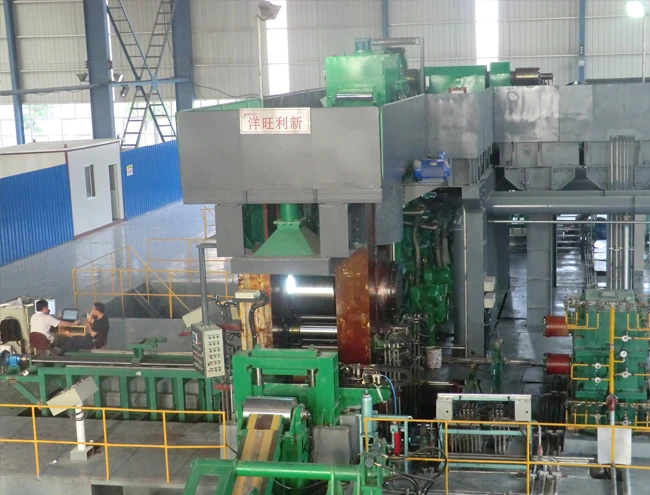
Roll Bonding Cladding | Superior Corrosion & Bond Strength
Roll Bonding Cladding is a key solution in the manufacturing industry, specifically within Special Equipment Manufacturing Industry and Manufacturing of metallurgical specialized equipment. This article explores how Beijing Yang Wang Li Xin Sci&Tech Co.,Ltd. supports professionals with durable, high-performance products, and explains why this product is an ideal choice for businesses in these sectors.

Table of Contents
- Roll Bonding Cladding Overview
- Benefits & Use Cases of Roll Bonding Cladding in Manufacturing of metallurgical specialized equipment
- Cost, Maintenance & User Experience
- Sustainability & Market Trends in manufacturing
- Conclusion on Roll Bonding Cladding from Beijing Yang Wang Li Xin Sci&Tech Co.,Ltd.
Roll Bonding Cladding Overview
Roll bonding cladding is a solid-state joining process that bonds a corrosion-resistant alloy (CRA) to a structural base metal through high pressure and controlled temperature during rolling. In hot roll bonding cladding, elevated temperatures enhance diffusion and bonding, enabling robust metallurgical interfaces without excessive dilution. The output is clad plate or sheet that combines the mechanical strength of carbon or low-alloy steel with the corrosion performance of stainless steel, nickel-based alloys, titanium, or other specialty materials. For the Manufacturing of metallurgical specialized equipment, this method underpins reliable pressure vessels, heat-exchanger plates, evaporators, and tube sheets, and provides feedstock for components later formed and welded, including clad pipe welding operations.
Beijing Yang Wang Li Xin Sci&Tech Co.,Ltd. engineers rolling solutions to deliver consistent bond integrity, uniform thickness, and excellent surface quality. With process know-how spanning material pairing, surface preparation, preheat strategies, and pass schedules, the company supports end users and fabricators as they scale from development plates to serial production. Typical outcomes include high shear strength at the interface, tight flatness control for downstream forming, and repeatable performance across batches—key requirements for B2B decision makers in critical industries such as petrochemical, power, mining, and marine.
Benefits & Use Cases of Roll Bonding Cladding in Manufacturing of metallurgical specialized equipment
In metallurgical equipment manufacturing, roll bonded clad plates are specified wherever harsh process media would otherwise mandate fully solid CRA construction. Typical applications include reactor shells and heads, separators, autoclaves, desalination units, urea and ammonia plants, digesters, and hydroprocessing equipment. Clad plates are also formed into pipe or fittings, then joined via clad pipe welding to maintain CRA continuity on the wetted side. By selecting hot roll bonding cladding for the starting plate, fabricators gain robust bond quality and cost control across a wide size range.
Key advantages for B2B buyers include: lower material cost versus solid-alloy construction, reduced overlay welding time, improved productivity due to superior plate flatness and thickness uniformity, and dependable interface properties that withstand forming and heat treatment. Beijing Yang Wang Li Xin Sci&Tech Co.,Ltd. supports these outcomes with engineering guidance on material pairing and rolling parameters, helping clients optimize performance for sour service, high-temperature chloride environments, and erosion/corrosion scenarios common in heavy industry.
Cost, Maintenance & User Experience
Total cost of ownership with roll bonding cladding is driven by alloy savings, yield, uptime, and downstream productivity. Because only the service-exposed surface uses expensive CRA, buyers avoid the premium of full-section exotic alloys while retaining corrosion resistance where it matters. Consistent bond quality and plate geometry reduce rework, simplify forming, and shorten fabrication cycles—directly improving ROI for pressure vessel shops and EPCs. Over the lifecycle, clad equipment typically extends service intervals versus unlined alternatives, translating to fewer shutdowns and lower maintenance budgets.
Users in the Special Equipment Manufacturing Industry value stable production and predictable quality. Feedback from fabricators indicates smoother forming, fewer bond-interface repairs during NDT, and better fit-up for clad pipe welding when plates originate from well-controlled roll bonded stock. Beijing Yang Wang Li Xin Sci&Tech Co.,Ltd. complements the equipment with responsive technical support and training, helping customers implement best practices in plate handling, edge preparation, and post-roll heat treatment to preserve bond integrity and maximize yield.
Sustainability & Market Trends in manufacturing
Global manufacturing is prioritizing decarbonization, resource efficiency, and compliance. Roll bonding cladding aligns well with these goals: it reduces the volume of high-embodied-energy alloys, cuts energy use compared to casting or forging fully solid CRA sections, and enables lighter designs with long service life. By improving durability in corrosive service, roll bonded clad equipment reduces unplanned outages and material waste over time—key sustainability wins for operators under tightening environmental and safety regulations across chemicals, refining, power, and desalination.
Beijing Yang Wang Li Xin Sci&Tech Co.,Ltd. takes a forward-looking approach, focusing on material utilization, process stability, and quality assurance that minimizes scrap. The company promotes best-practice routes for hot roll bonding cladding, supports digital quality records, and encourages repair-avoidance via robust surface preparation and bonding parameters. As market demand grows for corrosion-resistant equipment with lower lifecycle emissions, the company’s expertise helps B2B buyers meet performance targets while advancing corporate sustainability objectives.
Conclusion on Roll Bonding Cladding from Beijing Yang Wang Li Xin Sci&Tech Co.,Ltd.
Roll Bonding Cladding delivers a powerful combination of strength, corrosion resistance, and cost control for the Special Equipment Manufacturing Industry and the Manufacturing of metallurgical specialized equipment. It streamlines production for pressure vessels, heat exchangers, and clad pipe systems while reducing alloy consumption and lifecycle costs. Beijing Yang Wang Li Xin Sci&Tech Co.,Ltd. is a trusted partner with the technical depth to help you specify, produce, and fabricate high-integrity clad products.
- Contact us: email: Alley.wang@bjywlx.com
- Visit our website: https://www.bjywlx.com
-
YWLX’s 1450mm Six-Hi Reversing Mill Goes Live in BangladeshNewsNov.24,2025
-
Adjusting Roll Gap in 6Hi Reversing Cold Rolling Mill for Thin StripNewsNov.13,2025
-
Quality Control Standards for Automatic Gauge Control in Strip RollingNewsNov.13,2025
-
Effect of Skin Pass Rolling on Metal DuctilityNewsNov.13,2025
-
Key Components of a Modern TempermillNewsNov.13,2025
-
Common Wear Patterns of Work Roll in Tandem Cold Mill OperationsNewsNov.13,2025
-
Revolutionary Skin Pass Rolling Technology for Enhanced Steel QualityNewsNov.04,2025










